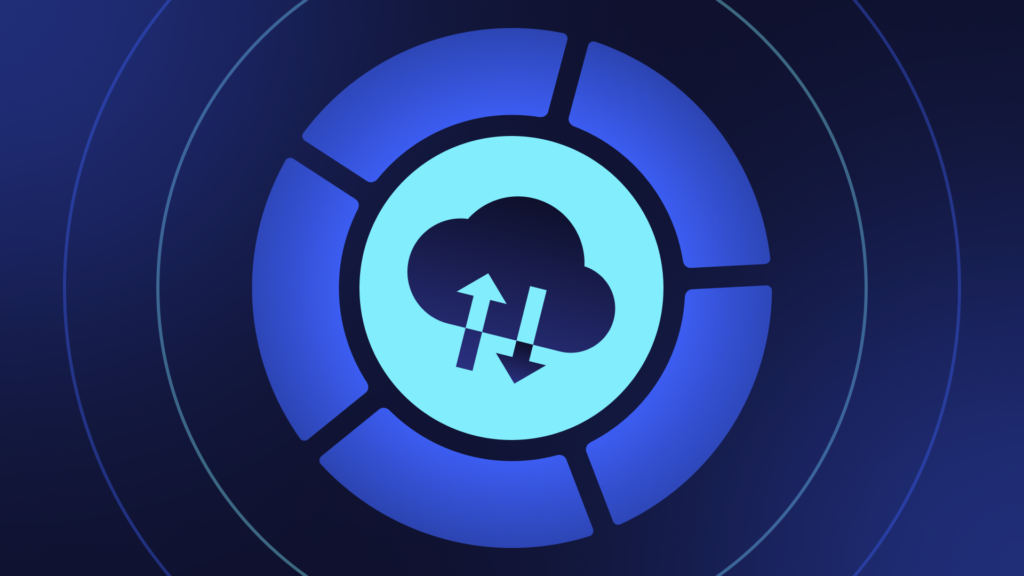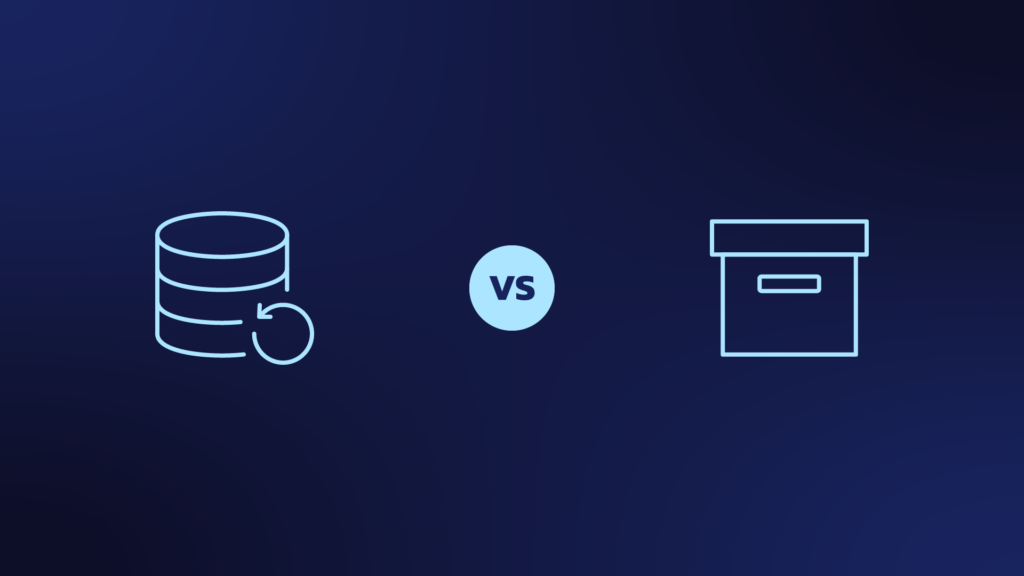How many times have you said “Back it up” to colleagues, customers, and even friends? A lot, we’d wager! You’ve probably heard it too. There is nothing worse than having a computer crash and hearing the words “did you back it up?” knowing you did not. Online stores and other web-based businesses are especially vulnerable to losing data.
An online backup is one of the best ways to protect your data and business from unexpected disasters. Storing data safely on an encrypted remote server is an easy and cheap way to safeguard your most important files, customer information, and more. If you have never heard of online backups before, we’ve got you covered. Here’s everything you need to know about them.
What is an Online Backup?
An online backup is when your data is copied to an “off-site’ or cloud backup service. Services will consistently and securely store copies of your data to the cloud, so your data is accessible anytime you get online. They’re an integral part of a business’ disaster recovery plan.
It’s important not to confuse these backup systems with cloud storage systems such as GoogleDrive or Dropbox. These systems require you to upload individual folders or files to their cloud backup services manually. Typically, you would upload some documents and media files that you wish to share with others, and access to cloud storage makes that easy to do. In contrast, an online backup automatically uploads all files, including documents, media files, and systems files, to a cloud server via the internet. Essentially, it makes a copy of your entire system and all the data associated with it and stores it in the cloud.
How Do Online Backups Work?
Online backups use a high-speed network connection to send your data to the cloud. Specific files (or the entire contents of your hard drive) can be sent to the cloud using this connection. It can also make copies of entire websites. Many backup-as-a-service (BaaS) products, including Rewind, integrate directly with online platforms such as Trello and GitHub. This allows the backup to cover a business’s entire account and all the data associated with it.
When an online backup is underway, your hard drives are scanned for important files, and those files are encrypted before being sent to the backup company’s online servers. Much of this is done automatically. Many services allow you to choose how often you would like automatic backups to occur. You can schedule them to happen periodically, continuously, or they can be triggered any time you make a change to your system.
All your data and files can be managed either through the storage provider’s web interface or using software that you download to your computer. Online backup services generally provide an admin dashboard that allows you to access your data, view your backups, and monitor the health of your files.
Cloud backup service providers use many techniques to reduce capacity, including “deduplication” to save space on their servers. This method only copies files once and then performs incremental backups, which only backs up changes made to a file instead of storing complete copies.
Online vs. Offline Backups
The standard advice is to back up your data locally on an external hard drive or a local server. Businesses have been using these solutions for decades. Offline backup systems are very convenient. They offer a one-time cost—i.e., the price of the external hard drive—and do not require an internet connection; therefore, there is less risk of your data being exposed.
Offline backups are done by copying the files from a source location to a target location. The target location can be a different device, such as an external hard drive, or another part of the same device. Offline backups can be used to restore files if the source files are lost or damaged.
Online backups are done by copying the files from a source location to a remote server. Online backups are subscription-based, which means you will have to pay fees, either monthly or yearly. Backups are stored off-site, often in cloud storage systems, so your data is secure and protected if there is a disaster at your office. An online backup service also provides you with customer service and security features. They are very user-friendly, and your files can be accessed anywhere, provided you have an internet connection.
Why Should You Back Up Your Data Online?
There are many reasons you should back your data up online. Local storage devices and systems can also be affected when a disaster (such as a flood or fire) strikes your infrastructure, causing data loss.
Major disasters are not the only threat to your data and media. Hard drive crashes, accidental deletion, and cyberattacks are also common, but the biggest cause of data loss is human error.
Not all threats to your data are a result of natural disasters or human errors. 64% of chief security officers believe their company is vulnerable to a cyber attack. Your business may not have the resources to combat a serious attack, nor could it survive the loss of critical files. Losing even a small number of files for a short period of time could be disastrous for a business, especially when trying to adhere to privacy laws like GDPR. All these things could cause your business or online store to suffer costly downtime. To determine just how much data loss could cost you, try our downtime calculator.
You may think you can avoid losing files in a cyberattack by using external hard drives to back up your data. However, external hard drives can easily go missing or become damaged. Also, if your external hard drive is connected to your computer, any threat that could infect your computer could also infect your hard drive, corrupting your data. Backing up locally is a good start when it comes to data security. However, you will also want to use cloud backup services for a complete backup of your files.
Pros and Cons of a Cloud Backup Service
Pros
There are many pros to using an online backup system:
Data Accessibility
Using a cloud backup solution means data is accessible anywhere, any time—as long as you have a network connection. You will also be able to use any type of device, including mobile, desktop, tablet, etc. Many backup services also enable various levels of access for your employees.
Few Hardware Requirements
Using an online backup system means you will have far fewer hardware requirements. You will not need to have additional local servers. While you may still want to keep some data on external hard drives, it is no longer required.
Reliable and Efficient
An online backup service employs the latest technology and innovations. They also use state-of-the-art facilities for their servers. By outsourcing your backup requirements, you will no longer need to maintain hardware and software upgrades or shoulder the maintenance costs. These are all the providers’ responsibilities.
Security
The best online backup services have all-around security. This means they protect your data from all potential threats. They don’t just protect against cyber threats. Their facilities can withstand hurricanes and have fire protocols in place. Many even have 24/7 on-site security to watch over the physical premises.
Convenience
Automated backups make life much easier for your team. You don’t have to hire additional staff or contractors to set up a backup infrastructure. Your in-house team can focus on your main product or service, not running and maintaining backups. Your provider’s customer service team ensures that any issue or problem can be solved quickly.
Cons
While we found very few cons to online backups, there are a few challenges to keep in mind.
Requires a Network Connection
All online backup systems and services require you to have an internet connection. If you would like to keep your data offline, this would not be possible. Most services will also ship you a disk or drive with your data if necessary. However, if internet services are down, for example, due to a local power outage, you may have trouble accessing your files.
Bandwidth Challenges
If you transfer large amounts of data to your online backup, you may run into bandwidth issues if you have a slow or unreliable internet connection.
Full Data Recovery Takes Time
Smaller files can be accessed easily and quickly. However, making a full data recovery with large amounts of data will take more time and could stress your local system.
Is Online Backup Secure and Safe?
One of the advantages of online backups is the security it provides. While on-site security for the servers is top-notch, you can also expect your data to be protected from virtual threats, and your privacy treated very seriously.
Most online backup services will provide you with a secure encryption key. This is a password chosen by you that will allow you to decrypt your backups if necessary. The encryption key is yours and yours alone. Even the backup service cannot help you reset the password if it is lost or forgotten. Encryption is a very secure solution with a high degree of privacy. Employees and even law enforcement will not be able to access your backups. Individuals and businesses often use password managers to keep track of their private encryption keys.
If you’re looking for even more security, some services provide a full suite of security features, including ransomware protection and two-factor/multi-factor authentication.
How Do Cloud Backup Services Restore Data?
When it comes to data restoration, the process is usually pretty simple, and the right provider can make it seamless. However, the process of data restoration can vary depending on the specifics of the situation. If you’re experiencing a data loss event, it is important to take action as soon as possible.
The restoration process begins by identifying the specific files or folders that need to be restored and then copying them over from the backup location. The transfer process begins over the internet, restoring the file back onto the local computer or device. Simply restoring from the backup will copy your data back to your computer.
Some online backup providers allow users access to their files through a web browser portal. These portals may also provide download links that can be used for file restoration. Some providers even offer mobile applications that can be used for restoring data.
Once the download is complete, users should verify that the data has been successfully restored.
What to Look for in Online Backup Services
In an age where having vital business information locked in someone’s desk drawer is simply not best practice, organizations need to develop effective strategies for data backup. For this reason — and many others — cloud backup services and remote storage solutions are becoming more and more popular.
When it comes to online data backup, there are a few key points to keep in mind when considering a provider. First, businesses should ensure that their chosen service provider is reputable and has a good track record. This can help ensure your data is safe and secure at all times.
Another important aspect to consider when choosing a data backup provider is the type and strength of security measures that they have in place. There should be a layer of security that protects your data from unauthorized access; reputable providers also use state-of-the-art security measures to protect it. They should also have a disaster recovery plan in place in case of an emergency.
You should also look for a company that provides great customer support. They should offer multiple ways to contact them in the event of emergencies or issues.
Finally, make sure the provider offers a wide range of features and can accommodate your specific needs. This will give you the flexibility to choose the right backup solution for your business.
Using the right provider means you and your team can spend more time focusing on your business and less time worrying about or recovering from data loss.
Choosing the Best Online Backup Service
When choosing the best online backup service, there are several things you will want to keep in mind. Start by determining how much storage space you require. Do you need unlimited online storage? Will you need versioning? Do you think you will need to scale up in the future?
Once you’ve answered those questions, you will need to look at encryption options and security. Do you need different levels of access for your team? If so, look for cloud storage that offers that capability.
You may also find you want an online backup service that understands your unique business. The importance of a service provider that understands your industry and your business’s needs cannot be understated.
At Rewind, we integrate backups for online stores, including Shopify and BigCommerce, addressing concerns unique to the ecommerce niche. Our products for accountants, including QuickBooks Online and Xero, are specifically designed with the unique privacy challenges of financial data in mind.
Hopefully, your business will never lose significant amounts of data or face a disaster that threatens your infrastructure. If disaster does strike, an online backup can be a lifeline. In short, moving to an online backup system is one of the best decisions you can make for your organization. While it might initially seem like a daunting process, the right service can make it easy and efficient. In no time at all, you will be able to rest easy, knowing your data is safe and secure.



